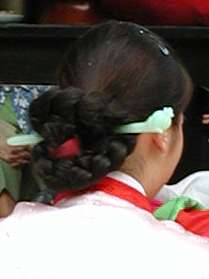Binyeo
.jpg)
Binyeo with dragon head

Binyeo
A binyeo (hangul: 비녀; Korean pronunciation: [bi.njʌ]) is a Korean traditional hairpin for fixing ladies' chignons. Its main purpose is to pin the chignon in place, but it also serves as ornamentation, and it has different usages or names according to its material or shape.[1] Binyeos are divided into two kinds, a jam (hangul: 잠; hanja: 簪; Korean pronunciation: [dʑam]) and a che (hangul : 채; hanja: 釵). Jams have a long body and ches have a ∩ shape. Binyeos are usually used by women, but they are also used by men to fix their sangtus (Korean topknots) in place.[2]
Origin
It is presumed that binyeos were used in the period of the Three Kingdoms of Korea with a Goguryeo ladies' hair style similar to chignons today.[3]
Comments
- Yisanghui, "flower viewing our culture", Nexus, 2004. 105 pages
- Korea Institute of archives, "Chosun era 3 life history", History bipyeongsa, 2006. Page 95
- Youngchinwang family boksik hanjari ...to May 23 the National Palace Museum Special Exhibition Cookie News 2010-04-27
- Yieoryeong, "bakmulji our culture", Design House, 2007. 274 pages
See also
References
| Wikimedia Commons has media related to Binyeo. |
- ↑ "Binyeo". Global Encyclopedia / Daum.
- ↑ "Jam & Che, and Male's use of Binyeo". National Museum of Korea.
- ↑ "Binyeo's Origin". Korean Britannica Online.
This article is issued from Wikipedia - version of the 9/30/2015. The text is available under the Creative Commons Attribution/Share Alike but additional terms may apply for the media files.